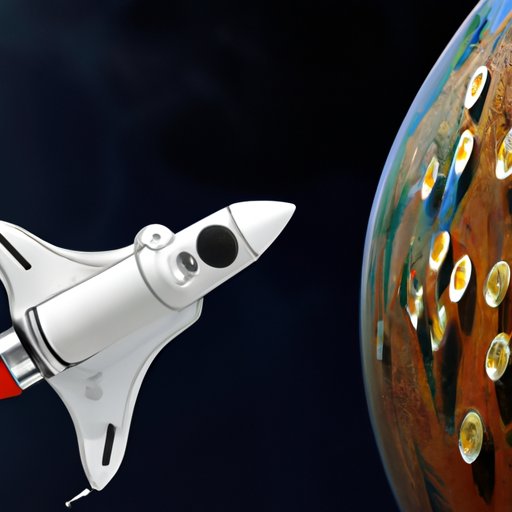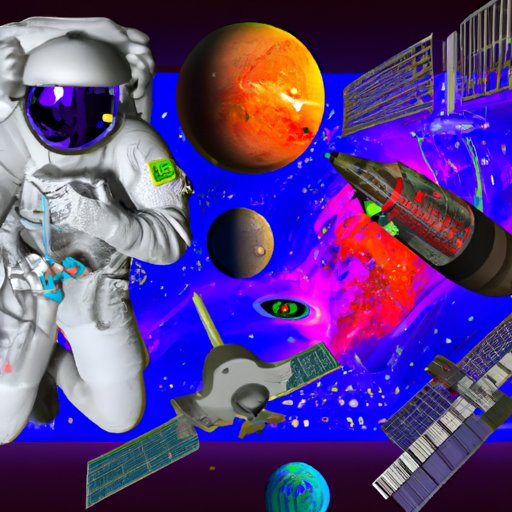Introduction
Space travel has been a dream of humanity since ancient times, and in recent decades, this dream has become a reality. With advances in technology, humans have sent robotic probes and astronauts into the depths of space, exploring the unknown and pushing the boundaries of our knowledge. But is space travel worth it? This article will explore the pros and cons of space exploration, weighing the costs and potential benefits to come to a conclusion about whether space travel is worth it.
Definition of “Space Travel”
For the purposes of this article, “space travel” refers to any activity that involves launching objects or people into outer space, including satellites, probes, and astronauts. This includes activities such as launching rockets and shuttles, conducting research in space, and visiting other planets or moons. Space travel does not include activities such as using telescopes or other instruments to observe space from Earth.
Overview of the Debate
The debate over whether space travel is worth it is complex and multifaceted. Proponents of space exploration argue that it can bring significant economic, technological, and scientific benefits, while critics point out the high costs and risks associated with space travel. In this article, we will take a comprehensive look at both sides of the debate to come to a conclusion about whether space travel is worth it.
Cost Analysis of Space Travel
One of the primary arguments against space exploration is the cost. Developing and launching spacecraft, robots, and people into space is an incredibly expensive endeavor, and the cost of space exploration can be prohibitive for many countries. Let’s take a closer look at the costs associated with space exploration.
Initial Investments in Space Exploration
Getting a spacecraft off the ground requires a massive investment in time and money. Building a launch pad and constructing a rocket can cost billions of dollars, and the cost only increases if you are sending humans into space or deploying multiple spacecraft. Additionally, training astronauts and mission control personnel can be costly, as can the development of new technologies necessary for space travel.
Ongoing Costs of Space Exploration
Once a spacecraft has been launched, there are ongoing costs associated with space exploration. Missions must be managed and monitored, and fuel and other supplies must be regularly replenished. Additionally, if the spacecraft is manned, astronauts must be paid and provided with food, air, and other basic necessities. All of these costs add up quickly, making space exploration an expensive endeavor.
Potential Cost Savings from Space Exploration
While space exploration is certainly expensive, it can also lead to cost savings in the long run. For example, launching satellites into orbit can enable more efficient communication, navigation, and data collection, which can save money over time. Additionally, research conducted in space can lead to the development of new technologies and processes that can be used on Earth, which can reduce costs and increase efficiency.

Economic Impact of Space Exploration
In addition to the direct costs associated with space exploration, there are also economic impacts to consider. Let’s take a look at how space exploration can affect the global economy.
Potential for Job Creation
Space exploration can create jobs both directly and indirectly. Directly, space exploration requires a large number of engineers, technicians, scientists, and other professionals to design, build, and manage spacecraft and missions. Indirectly, space exploration can create jobs in related industries, such as manufacturing, telecommunications, and computing.
Impact on Global Economics
In addition to creating jobs, space exploration can also have a positive impact on the global economy. By developing new technologies and methods, space exploration can open up new markets and opportunities. Additionally, by enabling more efficient communication and data collection, space exploration can make it easier for businesses to operate and expand.
Environmental Impact of Launching Objects into Space
Launching objects into space also has an environmental impact, both during the launch itself and in the long term. Let’s take a look at some of the potential environmental effects of space travel.
Pollution from Rockets
When a rocket launches, it emits pollutants into the atmosphere, including carbon dioxide, nitrogen oxides, and other substances. These pollutants can contribute to climate change and other environmental problems.
Debris from Launches
In addition to polluting the atmosphere, launches can also leave debris in space. This debris can damage other spacecraft and satellites, and can also interfere with communication and navigation systems.
Long-Term Effects of Space Travel
Finally, there are potential long-term effects of space travel that we don’t yet fully understand. For example, exposure to cosmic radiation and microgravity can have negative effects on human health, and traveling through deep space could have unforeseen consequences that we don’t yet understand.

Benefits of Space Exploration for Humanity
Despite the risks and costs associated with space exploration, there are also numerous potential benefits for humanity. Let’s take a look at some of the potential advantages of space exploration.
Advances in Technology
Space exploration can lead to advances in technology, both in terms of the technology used to explore space and the technology developed as a result of space exploration. Technologies such as satellite communications, GPS, and solar energy were all developed as a result of space exploration, and new technologies are constantly being developed.
Inspiration to Pursue Science and Engineering
Space exploration can also inspire people, especially young people, to pursue careers in science and engineering. Stories of space exploration can ignite the imagination and inspire people to pursue their dreams and reach for the stars.
Enhanced Understanding of Our Universe
Finally, space exploration can help us gain a better understanding of our universe. By exploring space, we can learn more about our own planet and the other planets, stars, and galaxies that make up our universe.
Scientific Discoveries Enabled by Space Travel
Space exploration can also lead to scientific discoveries that can benefit humanity. Let’s take a look at some of the potential scientific breakthroughs enabled by space exploration.
Astronomy and Astrophysics
Exploring space can help us learn more about astronomy and astrophysics. By studying the stars, planets, and galaxies, we can gain a better understanding of the origins and evolution of our universe.
Life Sciences
Exploring space can also yield insights into the life sciences. By studying other planets, we can learn more about the conditions necessary for life and the potential for life outside of Earth.
New Sources of Energy
Finally, space exploration can help us find new sources of energy. By tapping into the sun’s energy, for example, we can develop renewable sources of power that can reduce our dependence on fossil fuels.

Risk and Dangers Associated with Space Travel
Of course, space exploration is not without risk. There are numerous potential dangers associated with space travel, both for the people involved and for the environment. Let’s take a look at some of the risks and dangers associated with space travel.
Human Health Risks
Exposure to cosmic radiation and microgravity can have negative effects on human health, including increased cancer risk and weakened immune systems. Additionally, living in space for extended periods of time can lead to physical and psychological problems.
Technological Failures
Space exploration also carries the risk of technological failure. If a spacecraft malfunctions or fails to function correctly, the mission can be put at risk. Additionally, if a spacecraft is damaged or destroyed, the mission can be put in jeopardy.
Unknowns of Deep Space Exploration
Finally, there are numerous unknowns associated with deep space exploration. Exploring the depths of space can lead to unexpected dangers, such as encounters with dangerous astronomical phenomena or hostile aliens.
Conclusion
The debate over whether space travel is worth it is complex and multifaceted. On one hand, space exploration is expensive and carries significant risks. On the other hand, it can bring economic, technological, and scientific benefits. Ultimately, whether space travel is worth it depends on the individual and the situation. For some, the risks may outweigh the rewards, while for others, the potential benefits may be worth the costs.
(Note: Is this article not meeting your expectations? Do you have knowledge or insights to share? Unlock new opportunities and expand your reach by joining our authors team. Click Registration to join us and share your expertise with our readers.)
